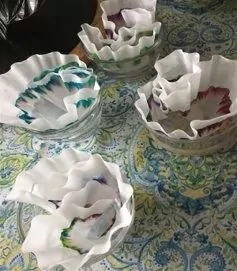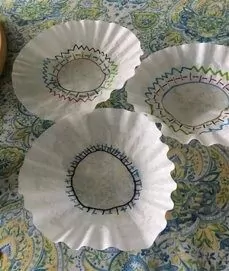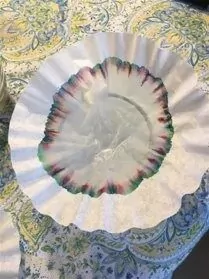Make-at-Home Chromatography Flowers for Mother’s Day

Flowers have been synonymous with Mother’s Day since its first celebration on May 10, 1908, when Anna Jarvis wore a pink carnation to a church service in honor of her mother. Today, we continue to express our love and appreciation for the women who’ve influenced our lives with flowers of all kinds. Help the kids in your life create a chromatography floral bouquet for a heartfelt, homemade Mother’s Day gift that is sure to be cherished for years to come.
Everything you need to know to create chromatography flowers
Materials
- White basket coffee filters
- Washable and/or water-soluble markers
- Shallow cup or bowl
- Pipe cleaners, straws, and/or popsicle sticks
- Hairdryer (optional but recommended)
Instructions
Flatten coffee filters and draw a design in marker, leaving the middle open (Figure 1) .

Fill shallow cups or bowls with a small amount of water and place the decorated coffee filter into the water, taking care to be sure the water only the non-colored part of the filter (Otherwise, your hand-drawn design will dissolve in the water!) Watch the water move the colors up the coffee filter, creating a beautiful design (Figure 2).

When the design moves to cover all but the top 25% of each filter, carefully remove the filters from the cups or bowls (Figure 3).

Set the colors by drying the filters using a hairdryer on its lowest setting, or allow the filters to dry completely (likely overnight). Once the filters are dry, create a flower using 1 or 2 filters, and attach a stem made with a pipe cleaner, straw, or popsicle (Figure 4).

What a great way to show some Mother’s Day love with creativity and brainpower! The Waters STEM Live Pen Peculiarities experiment is similar to this fun craft – watch the video to show kids how it works and the basics of chromatography!
From all of us at Waters, Happy Mother’s Day!
Popular Topics
ACQUITY QDa (16) bioanalysis (11) biologics (14) biopharma (26) biopharmaceutical (36) biosimilars (11) biotherapeutics (16) case study (16) chromatography (14) data integrity (21) food analysis (12) HPLC (15) LC-MS (21) liquid chromatography (LC) (19) mass detection (15) mass spectrometry (MS) (54) method development (13) STEM (12)


